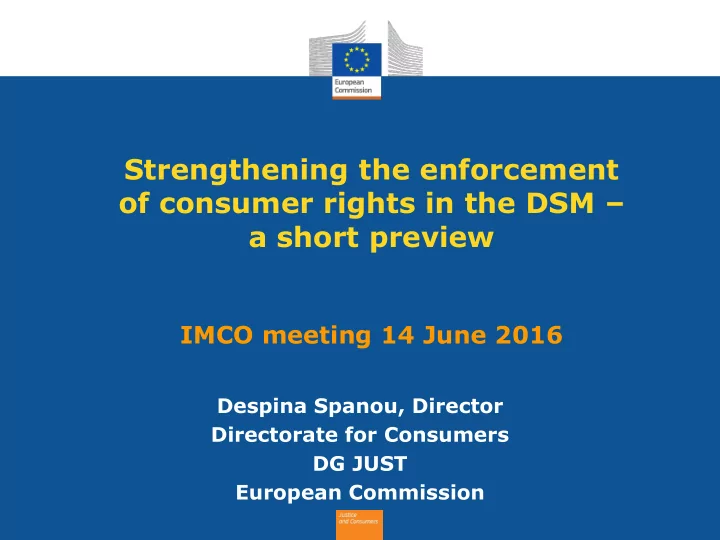

Strengthening the enforcement of consumer rights in the DSM – a short preview IMCO meeting 14 June 2016 Despina Spanou, Director Directorate for Consumers DG JUST European Commission
The 2004 Consumer Protection Cooperation (CPC) Regulation • A unique cooperation • Coordinated procedures framework to protect that enable the pooling of collective economic resources and more consistent interests of consumers enforcement approaches when harmful practices concern 2 or more EU countries • A common toolbox: minimum powers needed for enforcement cooperation in the cross- border context • A broad scope: its Annex covers the consumer acquis and sectorial laws
Enforcement cooperation: What was achieved up to now? Apple, Google 5 big car hire & Amazon companies = changed 65% of the EU marketing market, of games pledged to offering in-app introduce fairer purchases conditions Hundreds of 4500 websites days of checked via training, sweeps since exchange of 2007 best practices, workshops
Why a modernised cooperation tool? 37% of e-commerce and booking websites in 5 key consumer sectors do not respect basic consumer rights (Impact Assessment study) EUR 770 million/per year estimated detriment for consumers shopping cross border in these online sectors
What will change ? FUTURE TODAY Authorities can only act • Authorities will be able to sanction short-lived against on-going illegal practices and prohibit their repetition practices • Extension of coverage to additional rights: geo- Some key consumer rights blocking, additional passenger rights, financial are not covered services • Extension of powers to closing down websites with Authorities have limited scams, obtaining full information on site owners powers to identify and and ensuring eventual consumer compensation deter online rogue traders Widespread issues • New EU level procedure launched and coordinated ("infringements") are not by the Commission tackled in a coordinated manner Sharing of intelligence is • Clearer alert procedure and concerned parties limited allowed to signal issues
Example of practices that will be better tackled with the new CPC A short duration cross border promotion by an airline … which later on cancelled the discounted tickets A long term subscription hidden behind an offer to try to win a phone for 1 € ! A "dematerialised" online trader not delivering design furniture – which relocated 4 times over 3 years 8000 complaints on car rental made to European Consumer Centres showing that consumers are treated unfairly across an entire cross border sector
Example of a widespread "infringement" Country A Instead of the required minimum 2-years legal guarantee free of charge, A large multinational sells its …Country X Country B A company products as having a 1-year selling commercial warranty that can consumer be extended to 2 years for an electronics in most Member additional fee. States Country D Country C
Overall expected benefits For Consumers For Businesses For Authorities • Easier compensation • More consistent and • Saving of up to 45% coherent of costs in • Illegal practices enforcement coordinated actions stopped faster in case the trader • One-stop-shop cooperates, or 75% • Fewer issues in the approach for EU level in case of litigation Single Market = less issues detriment • Increased • Level playing field governance of cross • Increased deterrence border markets, over scams especially online.
Update of the UCPD guidance • Surveys show that unfair commercial practices are still a significant problem for consumers : • • 44% of consumers say that they have come across misleading or deceptive advertisements, statements • or offers at least once in the past 12 months. • • Of those who have encountered misleading or deceptive advertising, nearly a quarter (23%) say that they bought something based on the claims made in the advertisement .
Importance of the UCPD in practice • Since it became applicable, the UCPD has been used extensively by enforcement authorities. • Statistics from the Consumer Protection Cooperation Network (CPC) show that by far the highest numbers of cross border issues concern the UCPD, representing about 48% of all cases dealt with during 2007-2015.
UCPD guidance on online platforms • The Guidance addresses the following platforms: • • Search engines • • Social media • • User review tools • • Comparison tools • • Collaborative economy platforms • • E-commerce platforms (marketplaces) • • App stores • • Collective buying websites
Example: Online platforms qualifying as traders have to comply with UCPD • Italian Consumer and Competition Authority, decision of 19 December 2014: • • An online travel intermediary was a “trader”, in relation to certain claims it had provided on its Italian website. • • The company’s role was not limited to storing information, but involved classifying information related to hotel facilities, restaurants and tourist attractions, including a comparison tool.
Example: Misleading statements about limited availability of a product • Dutch Advertising Code Committee, April 2014 advertisements on accommodation: • • Booking platform found to be misleading. • • Messages such as ‘Only 1 room left’. • • The platform’s failure to inform consumers that its claims related only to rooms available on the platform meant that consumers could be misled into believing that the hotels were fully booked.
Publication of the UCPD guidance • The updated UCPD guidance is available at • http://ec.europa.eu/justice/consumer- marketing/files/ucp_guidance_en.pdf • Translations into all official EU languages will follow shortly.
CPC review and UCPD guidance • Thank you very much for your attention! • Contact: JUST-CONSULT-E@ec.europa.eu
Recommend
More recommend